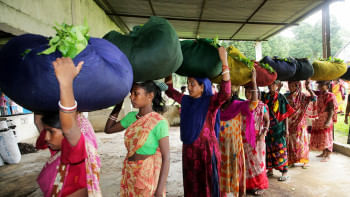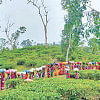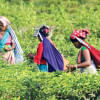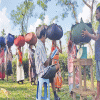Climate change is taking a toll on tea production

The tea industry of Bangladesh is facing an unprecedented crisis that threatens the country's economic health and the livelihoods of many. A prolonged heatwave and severe drought, which began at the end of Chaitra (the last month of the Bangla calendar), are wreaking havoc on tea gardens, particularly in Moulvibazar and surrounding districts. The situation is so dire that industry insiders are warning that the sector may fail to meet its 2025 production target of 103 million kilogrammes of tea. In fact, production has consistently fallen short of expectations in recent years. The primary culprit is a combination of extreme weather conditions, poor management practices, and insufficient infrastructure. If immediate action is not taken, this vital sector, which provides jobs for thousands of workers, could be irreparably damaged.
The scale of the problem is evident in the current weather patterns. According to Md Anisur Rahman, in charge of the Sreemangal Meteorological Observatory, typical rainfall during this period should range from 15 to 20mm. However, last year, Sreemangal, considered the tea capital of the country, saw 48mm of rain, while this year, only 4mm of rain has been recorded—a sharp decline that has exacerbated the ongoing drought. The considerably lower rainfall has left the tea estates parched. As a result, they are unable to sustain their crops.
For the tea industry, the timing of the drought could not be worse. January production figures, according to Bangladesh Tea Board Statistical Bulletin, 2025, have already shown a massive shortfall: only 309,000 kg of tea were produced, far below expectations for the month. Tea gardens are entering the critical plucking season, but with no new buds sprouting and existing bushes dying due to the heat, workers are finding it nearly impossible to harvest the leaves required for production. The combined effects of insufficient rainfall and extreme heat are taking a toll on the plants, with around 40 percent of newly planted saplings withering and 10 percent of mature tea bushes suffering significant damage.
The tea industry is inherently vulnerable to the effects of extreme weather, but what makes the current crisis particularly alarming is the degree of damage being done. Heatwaves push temperatures far above the tolerable range for tea bushes, which can withstand temperatures up to 29 degrees Celsius without permanent harm. The lack of shade trees, a critical component in protecting tea bushes from the heat, is compounding the problem.
Tea plants require shade to survive in hot climates, as it allows them to maintain a cooler microclimate underneath the canopy. According to experts, each acre of tea garden should have between 300 and 350 shade trees, yet many gardens no longer maintain these numbers. As a result, without sufficient shade, the plants are at risk of overheating, decreasing the yield and quality of the tea. The lack of shade is a direct consequence of poor management practices, as garden owners have neglected to invest in shade tree planting, choosing instead to focus on maximising the land for tea production.
The situation is further compounded by the scarcity of water. Tea gardens, especially those in more remote regions, rely heavily on natural water sources or small irrigation systems to maintain their crops. However, with water sources running dry, many tea estates are struggling to keep their plantations hydrated. Estate workers, who are already facing increased pressure to maintain the gardens, are now forced to make do with limited water, which further hampers the growth of the tea bushes.
The tea industry is a cornerstone of Bangladesh's economy, employing hundreds of thousands of workers, many of whom live in tea estates and depend on the harvests for their livelihoods. As the tea gardens struggle to produce, these workers face severe uncertainty about their income. The crisis is not just an environmental issue but a socioeconomic one, as many families in tea-growing regions are at risk of losing their jobs or experiencing reduced wages.
Moreover, the tea industry contributes significantly to the country's export earnings. Any disruption in production has far-reaching consequences, both in terms of revenue and the reputation of Bangladeshi tea in global markets. If the current trend continues, Bangladesh may struggle to maintain its position as a key player in the global tea trade, and the long-term effects could be devastating for the economy.
While the current drought and heatwaves are unusual, they are not isolated events. Climate change is exacerbating the severity of weather patterns, and the tea industry must adapt to this new reality. Experts have pointed out the need for both short-term solutions to manage the current crisis and long-term strategies to make the tea gardens more resilient to future climate challenges.
The Bangladesh Tea Board, in collaboration with the Bangladesh Tea Research Institute, must immediately focus on enhancing water management systems across tea estates. Water reservoirs should be built, and more efficient irrigation techniques should be adopted to ensure that every garden has a steady supply of water, even in times of drought. Additionally, efforts must be made to restore shade trees across all tea estates. Not only will these trees help protect the plants from heat stress, but they also contribute to the overall health of the ecosystem in tea-growing regions.
Planting climate-resilient tea varieties should also be prioritised. Several tea varieties are better suited to hotter and drier conditions. These should be incorporated into tea estates to help mitigate the damage caused by rising temperatures. Furthermore, estate managers should receive better training in sustainable agricultural practices, including the maintenance of shade trees, improved irrigation systems, and pest control measures that do not rely on chemicals, which can further harm the environment.
The tea workers themselves must also be given more support. Many of them work under harsh conditions, often with limited resources and low wages. In times of crisis, these workers must be given proper compensation and provided with the necessary tools and training to manage the tea gardens effectively.
Bangladesh's tea industry is facing a crossroads. Without immediate action, the sector may suffer long-term damage that will have repercussions for the economy, the environment, and the livelihoods of the workers who depend on it. The government, industry leaders, and estate managers must collaborate urgently to implement sustainable practices, improve infrastructure, and provide support to the workers who are at the heart of the industry. If the right steps are taken now, the tea gardens of Bangladesh can survive this crisis and emerge stronger, better equipped to withstand the challenges posed by a changing climate.
Mintu Deshwara is a journalist at The Daily Star.
Views expressed in this article are the author's own.
Follow The Daily Star Opinion on Facebook for the latest opinions, commentaries and analyses by experts and professionals. To contribute your article or letter to The Daily Star Opinion, see our guidelines for submission.

 For all latest news, follow The Daily Star's Google News channel.
For all latest news, follow The Daily Star's Google News channel. 










Comments